- Home
- Jack Kerouac
Jack Kerouac and Allen Ginsberg Page 6
Jack Kerouac and Allen Ginsberg Read online
Page 6
I had sent them “Denver D. [Doldrums]” but, as luck would have it, I have some compacted things around that he will get next week.
Your season sounds beautiful. I particularly wish I had seen Lucien so drunk. Make what you want out of that.
No, it sounded like you. (Some one is singing a ditty “So please pass a little piece of pizza”) and it makes me wish I were alive, that’s why I can’t say any more.
Everybody’s fine, but it’s sweet, beautiful, but not so dumb, this world. Lucien means dumb because we don’t know what we know. I mean, won’t admit how much we know.
White19 said that Scribner’s rejected you, too, just like the goil. Can I see the novel [The Town and the City]? But don’t worry, it really don’t mean a thing. That’s my opinion.
Grebsnig
Allen Ginsberg [East Harlem, New York] to
Jack Kerouac [Ozone Park, New York]
July 3, 1948
Dear Jack:
[ . . . ]
Yes, daddio I am in Harlem, reading Huckleberry Finn. I have a radio and I listen to everything when I like it, Durgin6 comes in and out all hours of the night drunk giggling over silly absurdities, we have short and long mad, even gleeful conversations, and I sit and write, and he sits and writes on T. Aquinas and Martin Buber and Shakespeare, and coughs. I am working up a great brotherly feeling for him, he is pretty great, and really sad. He knows all the bars all over the city: he knows the city, and he doesn’t care, he is too thoughtful over the Soul in a theological way. He is going away to have his lung deflated up in Saranac20 in a few days. I sit and tell him improvised stories about walks I take into Harlem, about seeing Lester Young at the Apollo, who Lester is, how he looks when he blows, about the landlady who is an old Jewess named Mrs. Bitter, etc.
What happened to [Allan] Temko21 in Frisco? Couldn’t take it? What does he know about Horror? What does he care, why doesn’t he get a job and stay there like an honest man? Why doesn’t he go to Paris and stay there and roll in the gutter? I can see him making a niggling fortune in the black market and sitting in Rumpelmeyers taking his perspectives. Tell him to take a pilgrimage to Aix (Cézanne) or Charleville.
I am learning by the week, but my poesy is still not my own. New rhyme new me me me in words. I am not all this carven rhetoric.
If you want to see swirl come to Harlem.
I am off this weekend to Paterson to dig poppa Louiay [Louis Ginsberg]. Come in anytime after that, say, Monday night or any night thereafter. I can be caught by phone on weekday mornings at the Academy of Political Science22 if you call Columbia regular Universal number, and ask for Academy, and ask for me, anytime before 10:30 in the morn.
I am struck by your ending. It might be great. It is the most promising if you just don’t fuck it up with Wolfe brooders.
“Anything you do is great.”
I wrote Neal a long letter, so long I had to send it in a package, and I copied out everything I’ve written beginning with “Dakar Doldrums.”
Mop, Ow.
Editors’ Note: During the summer of 1948, while living in Russell Durgin’s apartment at 321 East 121st Street in East Harlem, Ginsberg experienced a series of cosmic visions and hallucinations. The first was of the voice of William Blake reciting poetry. That was followed by a period of heightened awareness that lasted on and off for a few weeks. These visions influenced Allen dramatically and were to occupy his thoughts for the next decade. In the following letter Ginsberg writes to Kerouac, trying to express what he has been going through spiritually.
Allen Ginsberg [East Harlem, New York] to
Jack Kerouac [n.p., Ozone Park, New York?]
Summer 1948
Dear Jack
I hope you remember still with me the conversation we had last week on 14 St. There was an element that entered into it of something that, has not been so clearly realized in our previous conversation—namely that X which I have (and you, and everyone for that matter) continually harped on for the last few months. It is important that we clearly understand (if anything is important to understand intellectually) the complete other-ness of the other world. It does not at any time come into our conscious worlds—except perhaps at rare moments—but I believe it is the only valuable thing, the only possession, the only thought, the only labor of worth or truth, and to that I have dedicated my self or to make it less of a self-hood, to that somehow I have been dedicated—much as the Kafka hero who wakes up one morning to find that something mysterious has found substantial form and is persecuting or prosecuting him, giving no rest—a time life and death struggle. The unreal has become for me the most real, now. That is perhaps why my conscious thought-life is so far removed from yours. What you shuddered at as madness—what you glimpsed as the fantastic—the most fantastic possible—possibility is I have seen for several months the only thing, the inevitable—the one. There is no evasion of it for me—I can’t forget what I have seen, and seen by myself for a few disparate moments more clearly than we guessed together last week. I once saw clearly beyond my life, and saw I had to go there. You may be annoyed at my repetitive use of words like “literal” and “actually” or “actuality” etc. but for lack of a vocabulary—and for lack of the immediate presence of what I was talking about I have been trying to express myself about a miracle.
I have been at it now for months trying intellectually to define, to describe, to show the existence of that something else that we know—something that we can know if we are able to shoulder the responsibility of destroying our present lives, but it is by its nature so far beneath or above existence as I normally know it that it is of no use except to invoke (as in a few conversations) the vague sensation of something dreamlike and white, arden-esque, ghostly about us—and that sense of fairy tale is the nearest in our conscious minds that we can approach. Once I give up this attempt I will be nearer to the ultimate realization that I strive for, for this is vain and defensive against the awful sensation of knowledge. If I did not have faith in the mechanical procedure of psychoanalysis as a way of making me face myself and god I would no longer wait here in the city for a vision, but I would have despaired of life here and left—on an actual pilgrimage, as of old—across the land, would throw myself on the mercy of the elements and die out of this life of vanity and fear, give up completely, and wander, without home, until a home were everywhere. It may seem anachronistic for me to combine such ambitions spiritually with psychoanalysis that will change everything—towards that goal. But that is my own life and choice, and I can’t presume to prescribe any medicine but suffering to anybody else—suffering to exhaustion, and exhaustion of suffering. Nothing that I know matters. Do you remember Spengler’s description of the magician idea of god?—on p. 23523—“as body and soul he belongs to himself alone, but something else, something alien and higher, dwells in him, making him with all his glimpses and convictions just a member of a consensus which, as the emanation of God, excludes error, but excludes also all possibility of the self asserting ego . . . the impossibility of a thinking, believing, and knowing ego . . . the idea of individual wills is simply meaningless, for ‘will’ and ‘thought’ in man are not prime, but already the effects of deity upon him.” I have more self asserting ego after all than anyone—a more vicious ego than you—a more “slopping” ego? and who but I would realize the ultimate of fantasy-nature of my ego? of all ego, all individual mind, personality? With all my demonic individualism, it is you who defend the ego and refuse to give your self up when it comes to that last battle for the inner heart. But that is the crucial battle—there is no inner heart but one with god, which is the same substance as everything else; no power of inwardness and secrecy has any meaning or force but as it is an expression of pride and fear of the one nation, the one spirit, the one emotion—the one unthinkable. Is it not so? But what I am talking about is veritable apocalypse (not merely mysticism) and so there is no use in my beating my meat so. Dies Irae! Someday when I enter another world I will find all this talk to have been an a
ttempt to deceive others as to the true nature of the apocalypse. But let there be terror in your heart for that day, as well. We will all be judged.
I may be in NY Wednesday. If so I will stop by the New School. Here, meanwhile, is a key to my apt.
Your fellow creature,
Allen
Jack Kerouac [Ozone Park, New York] to
Allen Ginsberg [n.p., New York, New York?]
September 9, 1948
Allen ami:
Yes, want to see you, but why don’t you simply come to my house at Ozone Monday—if not afternoon, evening or late night. I’m very busy staving off the horror of form-letter rejections from publishers and plotting new attempts. Must revise even more, too. Barbara Hale thought novel was “great but awkward”—but the Talking Class which runs publishing is looking for slickness of course. I’m going to North Carolina in few weeks to run brother-in-law’s parking lot and woo a nurse and have a rest from this awful shallow literary world I have to do business with. What’s this about Claude de Maubri [Lucien Carr]? . . . actually true? I turned down job at U.P. [United Press] because it is beneath my dignity, with a novel like that written and rejected like silent sorrowful Sam Johnson. Pfui! Saw The Idiot, loved Rogozhin most. Come over! (Lundi)
J.
Editors’ Note: Once again Ginsberg wrote to Kerouac about his visions, this time denying that they had happened. Jack wrote in the margin of the letter, “when he was flipping,” which was accurate. Ginsberg was never closer to madness than he was during this period.
Allen Ginsberg [n.p., East Harlem, New York?] to
Jack Kerouac [n.p., Ozone Park, New York?]
ca. late summer 1948
Dear Jack:
I am insane does that surprise you? Ha! I think my mind is crumbling, just like crackers. If I had written five minutes earlier I would have wept, if I had written ten minutes earlier I would have told you to leave me alone, if I wait any longer I won’t write at all. I’m afraid I can’t answer you sincerely at the moment. Your letter was so obviously natural. What am I supposed to say? I can see you reading this and telling me coldly to stop posing, because I am posing, posing as if I were posing from the Underground. But I have a great faith in the supreme physician.
Be that as it may I thought that I impressed you so much with my latest vision that you wouldn’t dare speak to me again without falling on your knees. Well no I don’t think so any more, not because I am more sensible or more just to you, but because I have found a better way of tormenting you, since you’re so open. The whole vision, it’s just rubbish, just a big fantasy. I’m not making this up now, I really knew it while I was telling you, though I only realized it fully later. In fact I don’t even care about it. If you think that that’s my major virtue, a vision, oh no, I have more important things to think about. However, just to ease your mind, the “Vision” had elements of nature in it but it was just a cover up for something more deep and horrible. No not just sex either.
If you want to know my true nature, I am at the moment one of those people who goes around showing his cock to juvenile delinquents.
I can’t really answer your letter, though I want to with a good deal of wishing and perception of what level you are on and I would be on.
You speak of me as obnoxious and I am.
Let me get out of this rut. Come and see me. No. I will come and see you. I have something to tell you.
Jack Kerouac [Ozone Park, New York] to
Allen Ginsberg [Paterson, New Jersey]
Sat. night Sept. 18, ’48
Wizard’s Shelf
Dear Allen:
I’ve been having some very mad thoughts since I saw you . . . visions that tell me there is no such thing as “life’s bitter mystery,” (Wolfe and others), but—never more clearly could I see that it is a beautiful mystery. And it is a mystery, you know. None of us understand really what we’re doing, whether it’s intentional or not, or whether we consider it this or that—it’s something else we’re doing, all the time, and very beautiful. Even the sharply inpiercing Carrs cannot always know what they’re really doing. After you left that day, I received a call from Tom Livornese24 and went to his house. We drank and stayed up all night, and went to N.Y. to transact some business of his. I waited for him in a Third Avenue bar, filled with visions. Your Cezanne paper swirled in my head, that is, the understanding of sight. I saw—and especially as New York was bright like a bonnet that day due to low humidity—I saw everything in its true contour and light. But this is not my point (the spiritual esthetic.) Not now. When he came back—it was now eleven in the morning—I called Lucien. Tom and I wanted to go on drinking, and I knew it was Lou’s day off. Lucien told us to come down and wake him up. We had Tristano25 records with us. We played them, and Lucien lay in bed trying to wake up, listening intently, after awhile, to Tristano; after which he got up. He had had a big hangover. I kept wondering how I should act to impress Lucien. But suddenly I just took sick, nauseous from no sleep and no eat, and just lay on the couch with my eyes closed. Lucien came over and yanked at my leg and grinned. He talked to Tom. Finally he gave me milk and I felt better. “I have a splendid idea,” he says, “we’ll go sit in Washington Square.” Barbara [Hale] was out of town, by the way, or of course? . . . We started down Sixth Avenue in that Cezanne light of the day. I pointed it out to Lucien, and he agreed. We went into a Parisian bar (the Rochambeau) and had three pernods. The bartender carefully iced the glasses, took the ice out, poured pernod, and water, and handed us the smoky green drink. Like the light of the day, and the light of Lucien’s intelligence, the pernod brought in another light. It warmed us, all three, in the pit of our stomachs. We sat radiantly together at the bar and drank slowly. Then again we wandered down the beautiful streets of the day. We went to visit some St. Louis friends of Lucien and had a hiball there and talked with them. They were very condescending young socialites, but Lucien was delighted to point out afterwards that their condescension nowhere approached that of Tom Livornese, who is after all richer than they. At this time Tom delighted Lucien forever by going into a certain nightclub . . . We were out of money and wanted to drink all day and night . . . by going into the nightclub and saying, “Does the name Livornese mean anything to you?” and they said certainly, and they cashed a $20 check for him, or that is, they gave him $20 on trust . . . I don’t know exactly, I was waiting outside the club looking at people go by, with new eyes. Lucien rushed out and told me that people were always going to get money by some ruse, some daring ruse like Tom’s, but never succeeded, but he had. We stood on the corner eating hotdogs then, and Lucien mentioned this to me with delight, as Tom was talking to him, and Tom turned to me and said: “Tell me later what he said.” Can you just see the rapport of all this? Then Tom left us $5 and went to dinner with his girl, saying he would meet us at another bar. Lucien and I drank and talked. He told me about you and him, just as you told me. And then he regretted that I had to be a “disreputable writer” and could not get into the economic system as he had done. But I knew he was saying that because he had once believed in “artistic communicative this-and-that” art that you and he used to talk about at Columbia, remember? I mean, for the first time, I am able to hear what people are saying from the other world. We don’t know what we’re saying: it appears that only God must know. We communicate to each other depthlessly, without the words we use. And it is the same in “bad” writing. And we continually worry about how we feel towards each other, whereas if we were God we would know that we always feel love for each other, without deviation, only with variations of complicated obtrusion and inversion of intent . . . well, confusion among other things. But more, more . . . Lucien and I then walked out of the bar because we wanted to see the light of the day before it sank in the West. It was now reddening in the streets, and we wandered to Washington Square together. There, among all the children, we walked. We saw a little girl fall down on her skates and scrape her knee, and get up and stamp up and down with pain an
d grief and resentment because she was hurt. Lucien said, “It’s so wonderful the way children express their pain.” He went over and patted the little girl on the head and said she would be all right. She pouted and blushed, and turned away. Her little companions giggled . . . and somehow they misunderstood what he said, and Lucien turned and said, “Oh now I didn’t say that . . . I said she would be all right.” But further misunderstandings, very small, ensued, and Lucien walked back to me a little defeated, embarrassed, but pleased, and the children were pleased. These swift obtrusions of real meaningful intent gave me an insight into what our communicative troubles are about: it’s just a kind of fear of being understood, or misunderstood, with love as the basic energy—for to be understood completely implies a kind of vacuum. Realize, Allen, that if all the world were green, there would be no such thing as the color green. Similarly, men cannot know what it is to be together without otherwise knowing what it is to be apart. If all the world were love, then, how could love exist? This is why we turn away from each other in moments of great happiness and closeness. How can we know happiness and closeness without contrasting them, like lights? In the truth of light and color, is the same truth, moral and psychological, and spiritual. Then, we walked along the park, and Lucien, tripping along on the edge of a pool, said, “And you know, Jack, it gets more and more joyous all the time.” He had been talking about his days at Elmira26 and all the hopes he had nurtured there. It occurred to me, you see, that Lucien was a man who was saved because he had once lost everything—in the same sense that Jesus advises us to lose all, to gain all. And that Lucien was not only saved, but gone—because of that loss once. This is what Bill aims at too, that is why he is a harlequin now. They have gained the kingdom by throwing all their earthly possessions and prides away, in a deeper sense. “It gets more and more joyous all the time . . . ”—spoken in the reddening sun of Washington Square.

 Tristessa
Tristessa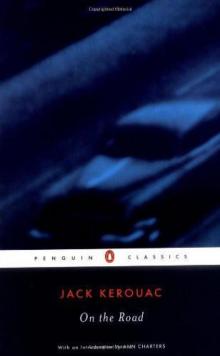 On the Road
On the Road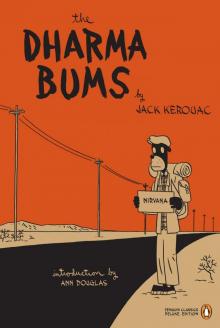 The Dharma Bums
The Dharma Bums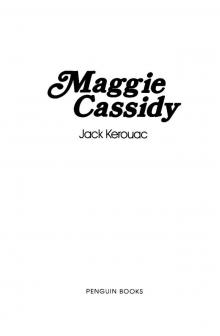 Maggie Cassidy
Maggie Cassidy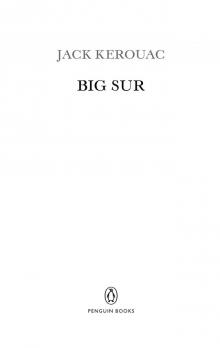 Big Sur
Big Sur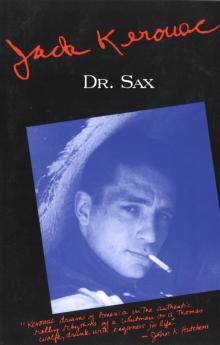 Dr. Sax
Dr. Sax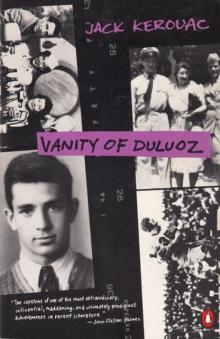 Vanity of Duluoz: An Adventurous Education, 1935-46
Vanity of Duluoz: An Adventurous Education, 1935-46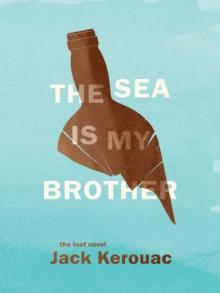 The Sea Is My Brother
The Sea Is My Brother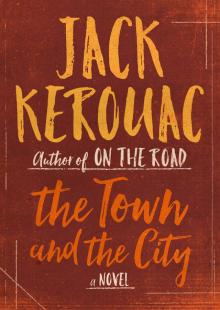 The Town and the City: A Novel
The Town and the City: A Novel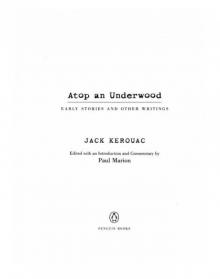 Atop an Underwood: Early Stories and Other Writings
Atop an Underwood: Early Stories and Other Writings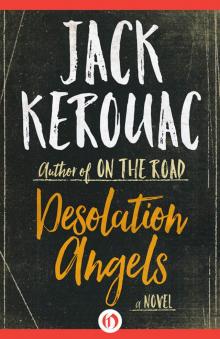 Desolation Angels: A Novel
Desolation Angels: A Novel Book of Sketches
Book of Sketches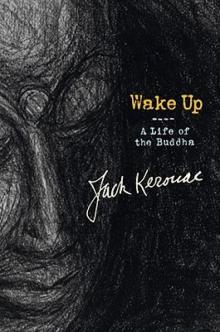 Wake Up: A Life of the Buddha
Wake Up: A Life of the Buddha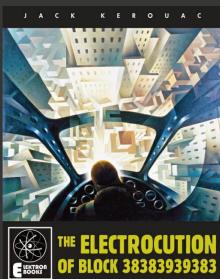 The Electrocution of Block 38383939383
The Electrocution of Block 38383939383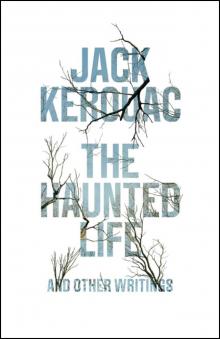 Haunted Life
Haunted Life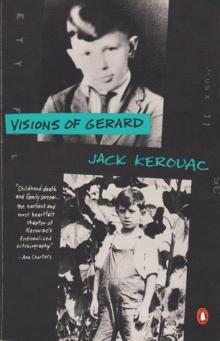 Visions of Gerard
Visions of Gerard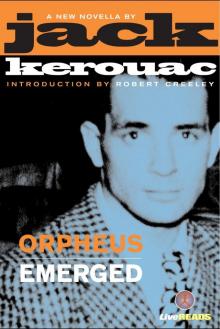 Orpheus Emerged
Orpheus Emerged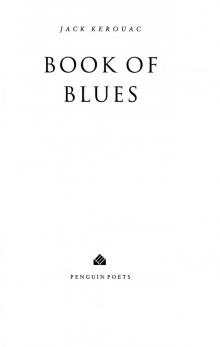 Book of Blues
Book of Blues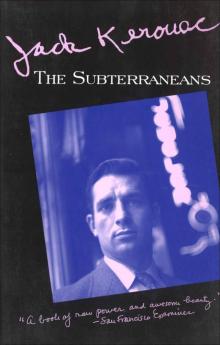 The Subterraneans
The Subterraneans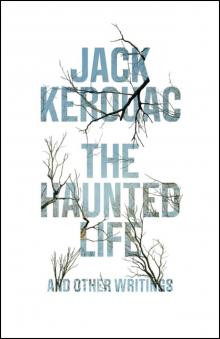 The Haunted Life
The Haunted Life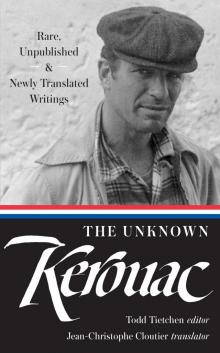 The Unknown Kerouac
The Unknown Kerouac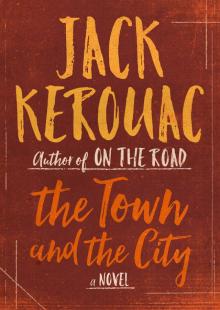 The Town and the City
The Town and the City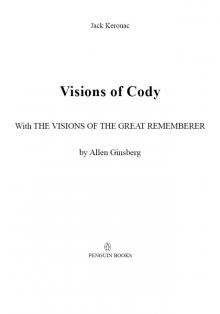 Visions of Cody
Visions of Cody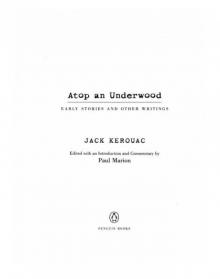 Atop an Underwood
Atop an Underwood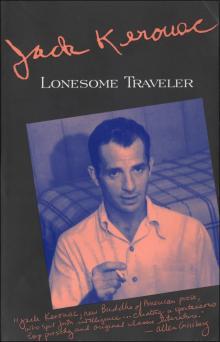 Lonesome Traveler
Lonesome Traveler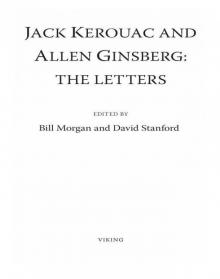 Jack Kerouac and Allen Ginsberg
Jack Kerouac and Allen Ginsberg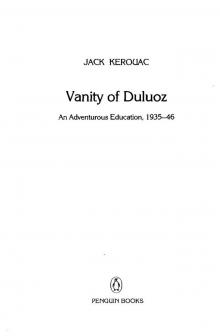 Vanity of Duluoz
Vanity of Duluoz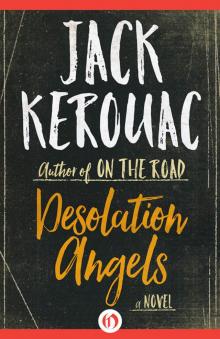 Desolation Angels
Desolation Angels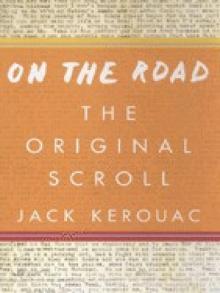 On the Road: The Original Scroll: (Penguin Classics Deluxe Edition)
On the Road: The Original Scroll: (Penguin Classics Deluxe Edition)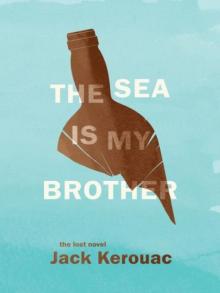 The Sea Is My Brother: The Lost Novel
The Sea Is My Brother: The Lost Novel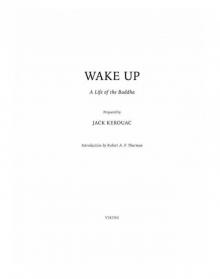 Wake Up
Wake Up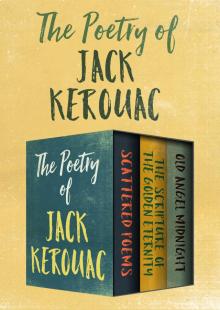 The Poetry of Jack Kerouac
The Poetry of Jack Kerouac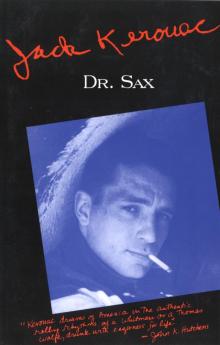 Doctor Sax
Doctor Sax